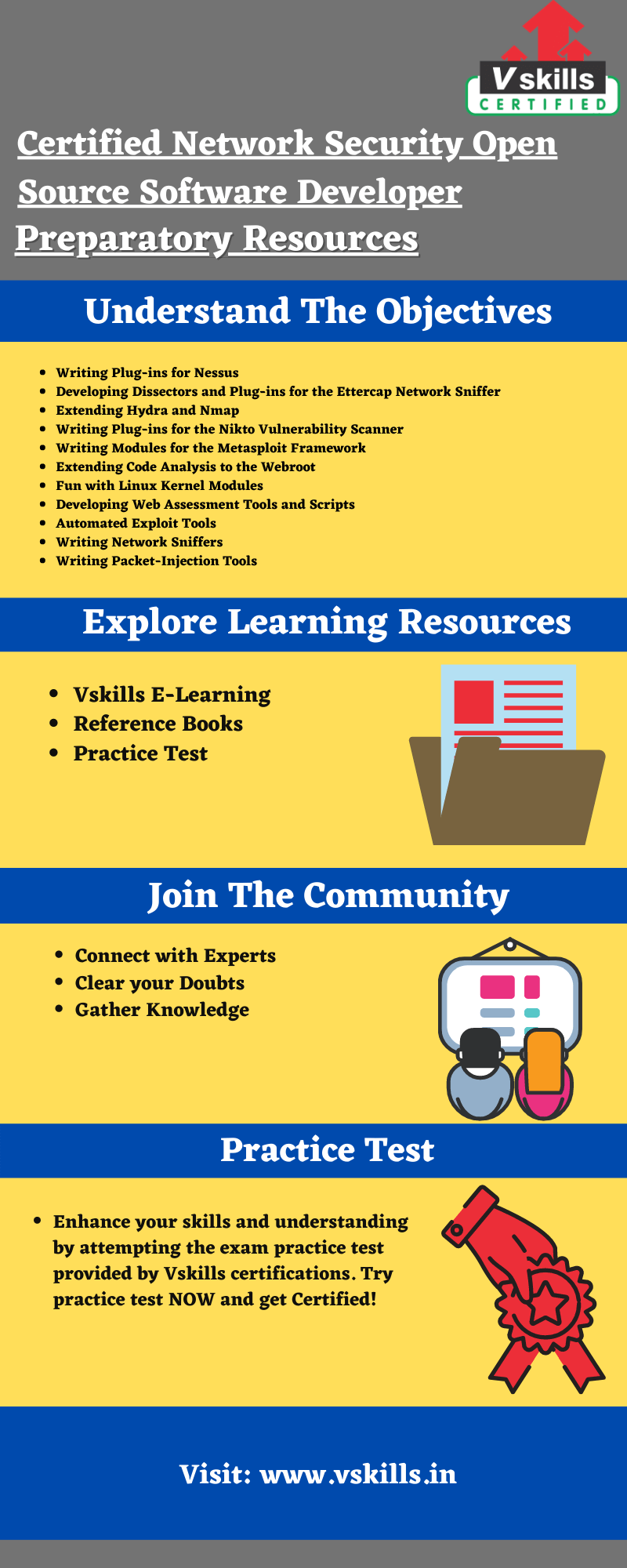
Vskills Certified Network Security Open Source Software Developer certification evaluates the candidate as per the company’s requirement for network security software development. The certification examinations the candidates on different sections in writing Plug-ins for nessus, Nikto vulnerability scanner, ettercap network sniffer, extending hydra and Nmap, extending Webroot, writing modules for the Metasploit framework, writing network sniffers, and packet-injection tools, etc. The Vskills certification proves that the candidate has such skills and knowledge.
Overview
The Vskills Certified Network Security Open Source Software Developer certification is dedicated to professionals and graduates wanting to shine in their chosen fields. It is also well suited for those who are already working and would like to take certification for further career progression. Winning Vskills Certification can help candidate differentiate in today’s aggressive job market, expand their employment possibilities by promoting their advanced skills and result in higher earning potential.
Vskills being India’s largest certification provider gives candidates access to top exams as well as provides after exam benefits. This includes:
- Become Government Certified Professional!
- The Certification is valid for life.
- Candidates will get lifelong e-learning access.
- Access to free Practice Tests.
- Candidates will get tagged as ‘Vskills Certified’ On Monsterindia.com and ‘Vskills Certified’ On Shine Shine.com.

Exam Details
- Exam Duration: 60 minutes
- Vskills Exam Code: VS-1145
- Number of questions: 50
- Maximum marks: 50
- Passing marks: 25 (50%)
- Exam Mode: Online
- There is NO negative marking in this module.
Certified Network Security Open Source Software Developer Course Outline
Certified Network Security Open Source Software Developer covers the following topics –
Writing Plug-ins for Nessus
- The Nessus Architecture
- Installing Nessus
- Using Nessus
- The NASL Interpreter
- Hello World
- Datatypes and Variables
- Operators
- ifelse
- Loops
- Functions
- Predefined Global Variables
- Important NASL Functions
- Nessus Plug-ins
Developing Dissectors and Plug-ins for the Ettercap Network Sniffer
- Installing and Using Ettercap
- Writing an Ettercap Dissector
- Writing an Ettercap Plug-in
Extending Hydra and Nmap
- Extending Hydra
- Adding Service Signatures to Nmap
Writing Plug-ins for the Nikto Vulnerability Scanner
- Installing Nikto
- Using Nikto
- Nikto Under the Hood
- Existing Nikto Plug-ins
- Adding Custom Entries to the Plug-in Databases
- Using LibWhisker
- Writing an NTLM Plug-in for Brute-Force Testing
- Writing a Standalone Plug-in to Attack Lotus Domino
Writing Modules for the Metasploit Framework
- Introduction to MSF
- Overview of Stack Buffer Overflows
- Writing Exploits for MSF
- Writing a Module for the MnoGoSearch Overflow
- Writing an Operating System Fingerprinting Module for MSF
Extending Code Analysis to the Webroot
- Attacking Web Applications at the Source
- Toolkit
- PMD
- Extending PMD
Fun with Linux Kernel Modules
- Hello World
- Intercepting System Calls
- Hiding Processes
- Hiding from netstat
Developing Web Assessment Tools and Scripts
- Web Application Environment
- Designing the Scanner
- Building the Log Parser
- Building the Scanner
- Using the Scanner
- Complete Source Code
Automated Exploit Tools
- SQL Injection Exploits
- The Exploit Scanner
- Using the Scanner
Writing Network Sniffers
- Introduction to libpcap
- Getting Started with libpcap
- libpcap and Wireless Networks
- libpcap and Perl
- libpcap Library Reference
Writing Packet-Injection Tools
- Introduction to libnet
- Getting Started with libnet
- Advanced libnet Functions
- Combining libnet and libpcap
- Introducing AirJack
Preparation Guide
Candidates brewing for the Certified Network Security Open Source Software Developer exam should recognize the importance of exam resources. During the exam preparation, it is important to get all the necessary exam study sources. This will provide the benefit to understand the concepts and meaning more precisely. In the preparation guide, we will review some of the most significant resources to help the candidate prepare well for the exam.

Exam Objectives
For every examination, the first task should be to get all the exam relevant details including the important contents and its topic. With complete exam objectives, the candidate’s exam preparation time is better spent because they already know what to study. For this exam, the topics include:
- Writing Plug-ins for Nessus
- Developing Dissectors and Plug-ins for the Ettercap Network Sniffer
- Extending Hydra and Nmap
- Writing Plug-ins for the Nikto Vulnerability Scanner
- Writing Modules for the Metasploit Framework
- Extending Code Analysis to the Webroot
- Fun with Linux Kernel Modules
- Developing Web Assessment Tools and Scripts
- Automated Exploit Tools
- Writing Network Sniffers
- Writing Packet-Injection Tools
Vskills Online Learning Material
Vskills provides candidates a way to prepare for the exam using the online learning material for existence. The online material for this is regularly updated. Moreover, e-learning is bundled with hard copy material which encourages candidates to enhance and update the learning curve for superior and better opportunities. The candidate can also download the sample chapter for the Certified Network Security Open Source Software Developer exam.
Vskills Brochure
Vskills also provides a brochure for the Certified Network Security Open Source Software Developer exam. The brochure contains all the necessary related to the exam such as details, sample papers, important information, course outline, etc.
Books for Reference
The next step in the preparatory guide should be books and study guides. The candidate needs to find those books which are enriched with information. Finding a good book may be a difficult task, but in order to gather knowledge and skills, the candidate has to find, read, and understand.
Practice Test
Practice tests are the one who ensures the candidate about their preparation for the exam. The practice test will help the candidates to acknowledge their weak areas so that they can work on them. There are many practice tests available on the internet nowadays, so the candidate can choose which they want. Try the practice test here!



